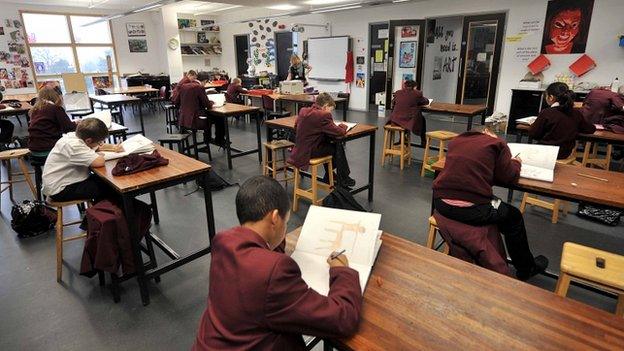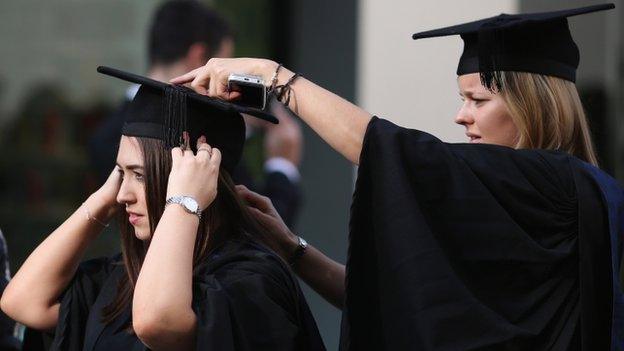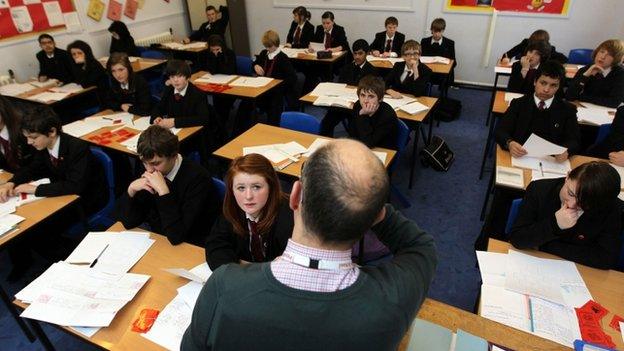Teachers work 'longer classroom hours'
- Published

The annual survey shows teachers in the UK have many more teaching hours than average
Teachers in England and Scotland have more teaching hours and bigger primary classes than in most other developed countries, according to an OECD annual education report.
The think tank says teachers' pay has declined in real terms.
The report also shows students in public higher education institutions in England pay the highest tuition fees.
But the OECD says high fees are accompanied by the highest levels of student support.
The Education at a Glance report compares the costs and characteristics of education systems in industrialised countries, from early years through to university.

How UK education compares:
high levels of early years enrolment, with 97% of three-year-olds in pre-school
42% enter higher education, compared with 34% OECD average
England has highest fees in non-private universities and highest level of support
graduates earn 54% more than non-graduates
primary and secondary spending per student above average
biggest difference in higher education - where UK spending is 62% above average
teacher-pupil ratios: 21 per teacher at primary, compared with 15 average; 18 per teacher at secondary, compared with 13 average
teachers' pay declined in real-terms between 2005 and 2013

It highlights that many countries face a challenge to recruit teachers - particularly when on average a primary school teacher earns 22% less than someone with similar qualifications.
"These uncompetitive salaries will make it harder to attract the best candidates to the teaching profession," says the report.
In England, head teachers have warned of a worsening teacher shortage, with recruitment targets being missed for several years running.
Teachers' unions have complained that an excessive workload is deterring people from staying in teaching - and the OECD's report shows how teachers in the UK compare with their classroom counterparts.

Graduates still have a strong advantage in the jobs market, says OECD study
It shows that primary classes are bigger than average. For state schools in the UK - not broken down into devolved administrations - there were 27 pupils per class, compared with an OECD average of 21 pupils per class.
In secondary schools, teachers spent an unusually high proportion of their working days in the classroom, rather than preparing lessons or training.
In secondary schools in England, teachers taught for about 100 hours more than the average for OECD countries per year. In Scotland, the proportion of time spent teaching was even higher, more than 200 hours above average.
The report also shows that teachers' pay in England has had an above-average decline in real terms, between 2005 and 2013.
Despite the recession, countries such as Poland, Germany, the United States and Australia had increased teachers' pay in real terms.
But in England, based on an analysis of secondary school teachers, pay had fallen, with only countries such as Greece and Portugal having a more substantial decline.

Teachers' unions warn of "burnout" from larger classes
A spokesman for the Department for Education said the report recognised "above average funding" for education in England.
"Great teachers are at the heart of this government's commitment to delivering educational excellence everywhere," he said.
"This is why we are not only tackling excessive teacher workload but have also given head teachers the freedom to pay good teachers more, meaning the best teachers can access greater rewards earlier in their careers."
But John Bangs, of Education International, an international federation of teachers' unions, said the OECD report showed that the "teachers' pay freeze is damaging education across many countries and that includes England".
"The best potential teachers are finding jobs in other, better paid professions," he said.
"The message on class size is also clear.
"In larger classes, teachers are spending more time on classroom control and less time on teaching.
"We also know that larger classes lead to teacher burnout and teacher shortage."
The study showed the high cost of university in England - with high levels of fees, high levels of student finance and high levels of expenditure per student.
The report shows a comparison of fees in public institutions - with England charging the highest fees in the world.
But this does not include private universities, such as many of the most prestigious and most expensive universities in the US.
Sir Peter Lampl, chairman of the education charity Sutton Trust, said: "These figures should cause the government to avoid steps that could hamper access, including replacing grants for poorer students with loans leaving them more indebted than richer students, cutting widening participation funding, or reducing the independence of the access regulator."
The study confirms the findings of previous reports, that despite increasing numbers of graduates, the advantage in earnings is not declining.
On average, graduate earnings are 60% above those who have not progressed beyond basic secondary school qualifications, equivalent to five good GCSEs.
In the UK, 71% of graduates are earning above the median salary.
As well as earning higher pay, this year's report says that graduates are much less likely to be unemployed. Graduates in the UK have among the lowest rates of unemployment among developed countries - only New Zealand has a lower proportion of unemployed graduates.
At the other end of the scale, based on figures for 2014, Greece and Spain have the highest rates of graduate unemployment.
Mr Schleicher said that the economic advantage for graduates showed the importance of fair access.
"Lack of a quality education is the most powerful form of social exclusion," said Mr Schleicher.
- Published19 November 2015

- Published14 January 2015